#Africa bureau
Explore tagged Tumblr posts
Text
Trump’s Africa Team Starts to Take Shape
@realDonaldTrump's #Africa team takes shape with @DrJPPham expected to lead @StateDept's @AsstSecStateAF & Joe Foltz as @WhiteHouse's Africa director. The team will tackle key challenges incl. #Somaliland's Recognition to counter #China's growing influence on the continent. #USAfricaPolicy
Continue reading Trump’s Africa Team Starts to Take Shape
#Africa#Africa bureau#Donald Trump#International Recognition#J. Peter Pham#Joe Foltz#Mathias Hammer#Recognize Somaliland#Republican Party#Rudy Atallah#Somaliland#Tibor Nagy#U.S. Africa policy#US Foreign Policy#US State Department#US-Africa#US-Africa relations#White house#White House National Security Council (NSC)#Yinka Adegoke
0 notes
Text
The ulterior motive to keep Haiti in turmoil
#haiti#iridium reserves#economics development#dr. henry vixamar#south africa#bureau of mines and energy#southeast department#beloc#alan k. hildebrand#university of arizona#bainet#economy#job creation#national economy#radio métropole
364 notes
·
View notes
Text
Overstaying South African national apprehended by immigration agents in province
Recently agents of the Bureau of Immigration (BI) located and arrested a South African national in the province of Albay for overstaying in the country by at least a few years, according to a Philippine News Agency (PNA) news article. To put things in perspective, posted below is an excerpt from the PNA article. Some parts in boldface… Immigration authorities arrested an overstaying South…

View On WordPress
#Africa#Albay#Asia#Blog#blogging#Bureau of Immigration (BI)#Carlo Carrasco#crime#crime news#crime watch#foreigners#geek#illegal aliens#immigration#law enforcement#law enforcers#Legazpi City#news#Philippine News Agency (PNA)#Philippines#Philippines blog#PNA.gov.ph#South Africa#South Africans#Southeast Asia#WordPress#WordPress.com
0 notes
Text
Things Biden and the Democrats did, this week.
The Consumer Financial Protection Bureau put forward a new regulation to limit bank overdraft fees. The CFPB pointed out that the average overdraft fee is $35 even though majority of overdrafts are under $26 and paid back with-in 3 days. The new regulation will push overdraft fees down to as little as $3 and not more than $14, saving the American public collectively 3.5 billion dollars a year.
The Environmental Protection Agency put forward a regulation to fine oil and gas companies for emitting methane. Methane is the second most abundant greenhouse gas, after CO2 and is responsible for 30% of the rise of global temperatures. This represents the first time the federal government has taxed a greenhouse gas. The EPA believes this rule will help reduce methane emissions by 80%
The Energy Department has awarded $104 million in grants to support clean energy projects at federal buildings, including solar panels at the Pentagon. The federal government is the biggest consumer of energy in the nation. The project is part Biden's goal of reducing the federal government's greenhouse gas emissions by 65% by 2030. The Energy Department estimates it'll save taxpayers $29 million in the first year alone and will have the same impact on emissions as taking over 23,000 gas powered cars off the road.
The Education Department has cancelled 5 billion more dollars of student loan debt. This will effect 74,000 more borrowers, this brings the total number of people who've had their student loan debt forgiven under Biden through different programs to 3.7 Million
U.S. Agency for International Development has launched a program to combat lead exposure in developing countries like South Africa and India. Lead kills 1.6 million people every year, more than malaria and AIDS put together.
Congressional Democrats have reached a deal with their Republican counter parts to revive the expanded the Child Tax Credit. The bill will benefit 16 million children in its first year and is expected to lift 400,000 children out of poverty in its first year. The proposed deal also has a housing provision that could see 200,000 new affordable rental units
11K notes
·
View notes
Text
Today is Erev Yom Ha'Shoah (Eve of Holocaust Memorial Day) in Israel. It will be observed by Jews outside of Israel, too.

The Hebrew date was chosen to honor the outbreak of the Warsaw Ghetto Uprising. It's also a week before Erev Yom Ha'Zikaron Le'Chalalei Ma'archot Yisrael (Eve of Israel's Memorial Day for its Fallen Soldiers and Terror Victims), which is itself observed a day before Yom Ha'Atzmaut Le'Yisrael (Israel's Independence Day). A lot of people have remarked on the connection between the three dates. On Yom Ha'Atzmaut, we celebrate our independence, which allows us to determine our own fate, and defend ourselves without being dependent on anyone else, right after we remember the price in human life that we have paid and continue to pay for this independence, and a week before we mourn the price we've had to pay for not getting to have self defence during the Holocaust. NEVER FORGET that in one Nazi shooting pit alone (out of almost two thousand) during just 2 days (Erev Yom Kippur and Yom Kippur 1941), more Jewish men, women and kids were slaughtered than in the 77 years since Israel's Independence War was started by the Arabs. This unbreakable connection between the living and the dead, between our joy and our grief, is often addressed with the Hebrew phrase, במותם ציוו לנו את החיים, "With their death, they ordered us to live."

On this Erev Yom Ha'Shoah, I'd like to share with you some data, published on Thursday by Israel's Central Bureau for Statistics (source in Hebrew).
The number of Jews worldwide is 15.7 million, still lower than it was in 1939, before the Holocaust, 85 years ago (that is what a genocide looks like demographically).
7.1 million Jews live in Israel (45% of world Jewry) 6.3 million Jews live in the US (40% of world Jewry)
Here's the data for the top 9 Jewish communities in the world:
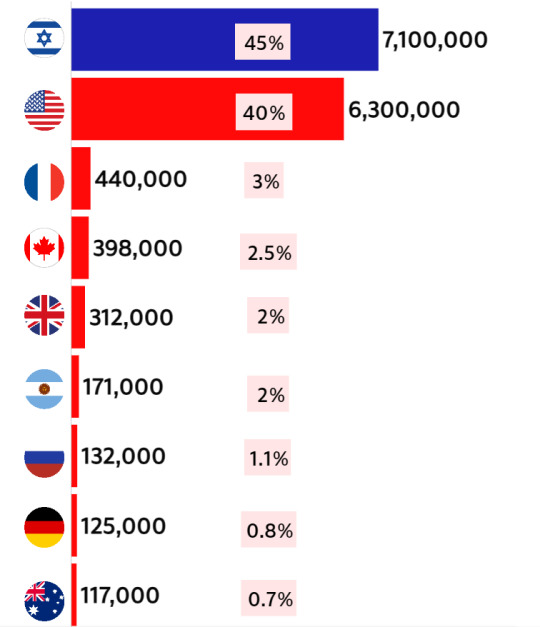
There are about 133,000 Holocaust survivors currently living in Israel. Most (80%) live in big cities in central Israel. Around 1,500 are still evacuated from their homes in northern and southern Israel due to the war (back in January, on International Holocaust Remembrance Day, there was a report about 1,894 survivors who also became internal refugees due to the war. Source in Hebrew). One Holocaust survivor, 86 years old Shlomo Mansour, is still held hostage in Gaza. He survived the Farhud in Iraq.
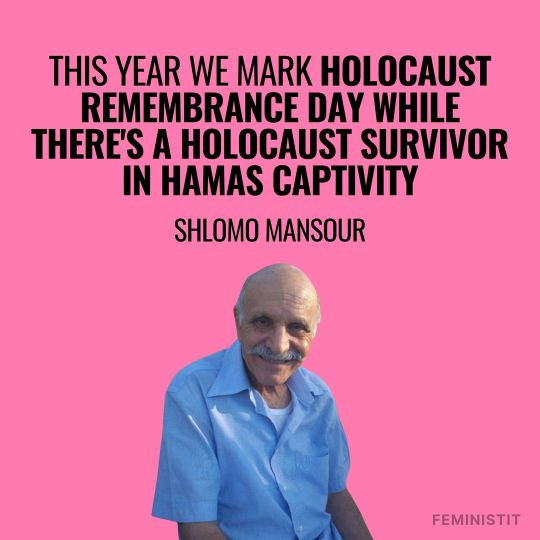
I haven't seen any official number for how many survivors had been slaughtered as a part of Hamas' massacre, despite everyone here being aware that Holocaust survivors had been murdered on Oct 7, such as 91 years old Moshe Ridler. Maybe, as we're still discovering that some people thought to have been kidnapped during the massacre, were actually killed on that day, no one wants to give a "final" number while Shlomo has not yet been returned alive.
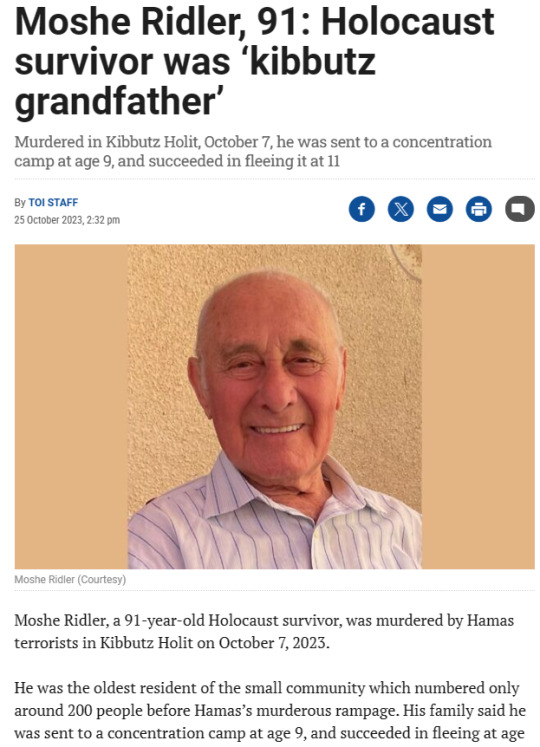
Out of all Israeli Holocaust survivors, 61.1% were born in Europe (35.8% in the countries of the former Soviet Union, 10.8% in Romania, 4.9% in Poland, 2.9% in Bulgaria, 1.5% in Germany and Austria, 1.3% in Hungary, 4.2% in the rest of Europe), 36.6% were born in Asia or Africa (16.5% in Morocco, 10.9% in Iraq, 4% in Tunisia, 2.6% in Libya, 2.1% in Algeria, 0.5% in other Asian and African countries) and 2.3% were born elsewhere.
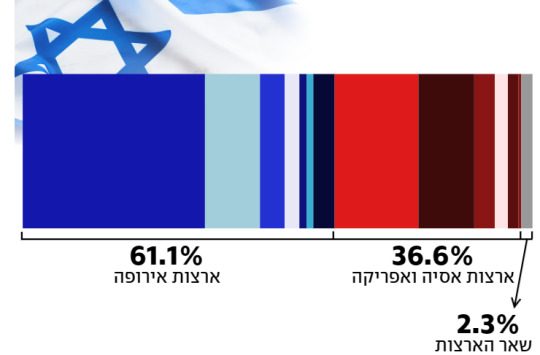
Out of all Holocaust survivors in Israel, 6.2% managed to make it here before the establishment of the state, despite the British Mandate's immigration policy against it (up until May 13, 1948). 30.5% made it to Israel during its very first years (May 14, 1948 until 1951), another 29.8% arrived in the following decades (1952-1989), and 33.5% made Aliyah once the Soviet Union collapsed, and Jewish immigration to the west (which included Israel) was no longer prohibited by the Soviet regimes (1990 on).
The second biggest community of survivors in the world is in the US, the third biggest (but second biggest relative to the size of the population) is in Australia. I heard from many Holocaust survivors who chose to immigrate there that they wanted to get "as physically far away from Europe as possible."
For a few years now, there's been this project in Israel, called Maalim Zikaron, מעלים זיכרון (uploading memory. Here's the project's site in Hebrew. In English it's called Sharing Memories, and here's the English version of the site) where Israeli celebs are asked to meet up with a Holocaust survivor (it's done in Hebrew), and share the survivor's story and the meeting on their social media on Erev Yom Ha'Shoah (which is today). Each year, there's also one non-Israeli Jewish celeb asked to participate (in English. This time around it's Michael Rapaport, he's meeting Aliza, an 81 years old survivor from the Netherlands, who was hidden along with 9 other Jewish babies for two years. He uploaded a preview of his meeting with her here, where he asked her what it means to her to be a Jew, and from what I understand, he will upload more today to the same IG account). This year, there will be an emphasis on Holocaust survivors who also survived Oct 7 (with 6 of the 20 participating survivors having survived Hamas as well). Here's a small bit from an interview with one such survivor, 90 years old Daniel Luz from kibbutz Be'eri:
(for all of my updates and ask replies regarding Israel, click here)
#israel#antisemitism#israeli#israel news#israel under attack#israel under fire#terrorism#anti terrorism#hamas#antisemitic#antisemites#jews#jew#judaism#jumblr#frumblr#jewish#israelunderattack#shoah#holocaust
467 notes
·
View notes
Text
Best News of Last Week - December 11
1. Biden administration to forgive $4.8 billion in student loan debt for 80,300 borrowers
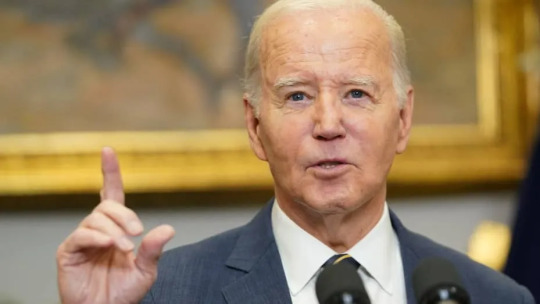
The Biden administration announced on Wednesday that it would forgive an additional $4.8 billion in student loan debt, for 80,300 borrowers.
The relief is a result of the U.S. Department of Education’s fixes to its income-driven repayment plans and Public Service Loan Forgiveness program.
2. Detroit on pace to have lowest homicide rate in 60 years this year
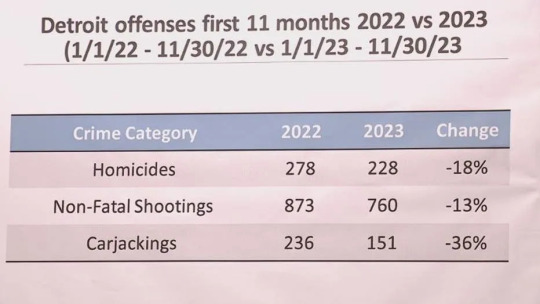
A partnership to reduce Detroit crime is being praised with the City on pace for the fewest homicides in 60 years.
"This is the day we’ve been waiting for, for a long time," said Mayor Mike Duggan. The coalition which includes city and county leaders that Detroit Police Chief James White formed in late 2021 to return the criminal justice system in Detroit and Wayne County to pre-Covid operations.
3. Dog that killed 8 coyotes to protect sheep running for Farm Dog of the Year

Over a year ago, Casper was stacked up against a pack of 11 coyotes, and he overcame them all to protect the livestock at his Decatur home. Now he needs your help.
Casper, the Great Pyrenees livestock guardian dog, needs the public to vote for him to become the American Farm Bureau's "Farm Dog of the Year: People's Choice Pup" contest.
4. Shimmering golden mole thought extinct photographed and filmed over 80 years after last sighting

De Winton's golden mole, last sighted in 1937, has been found alive swimming through sand dunes in South Africa after an extensive search for the elusive species.
5. About 40% of the world's power generation is now renewable

The International Renewable Energy Agency (IRENA) and World Meteorological Organization (WMO) have released their first joint report to strengthen understanding of renewable energy resources and their intricate relationship with climate variability and change.
In 2022 alone, 83% of new capacity was renewable, with solar and wind accounting for most additions. Today, some 40% of power generation globally is renewable, due to rapid deployment in the past decade, according to the report.
6. Jonathan the Tortoise: World’s oldest living land animal celebrates 191st birthday

The world’s oldest living land animal - a Seychelles giant tortoise named Jonathan - has just celebrated his 191st birthday. Jonathan’s estimated 1832 birth year predates the invention of the postal stamp, the telephone, and the photograph.
The iconic creature lived through the US civil war, most of the reign of Queen Victoria, the rise and fall of the Soviet Union, and two world wars.
7. New enzyme allows CRISPR technologies to accurately target almost all human genes

A team of engineers at Duke University have developed a method to broaden the reach of CRISPR technologies. While the original CRISPR system could only target 12.5% of the human genome, the new method expands access to nearly every gene to potentially target and treat a broader range of diseases through genome engineering.
---
That's it for this week :)
This newsletter will always be free. If you liked this post you can support me with a small kofi donation here:
Buy me a coffee ❤️
Also don’t forget to reblog this post with your friends.
908 notes
·
View notes
Text
being on doomsday clock time all summer has been very surreal, if i'm being honest. all of the time in the world is running out. we have a handful of years left to prevent the next bomb going into the silos, the sponge, the tactical pretext for the doctrine of mutually assured destruction, doomed to extend a hundred years into the future undetonated, if all goes according to plan, if we don't prevent the next bombs. i'm digging into bad scans of policy documents from 50yrs ago and then i go to the bar and a law student, already in postgrad and ten years younger than me, chats me up about chiang kai-shek because i'm sitting alone for a minute after the drag competition ends because it's gotten almost too cold for the patio. and he thinks he's doing it because i was sitting alone, almost like he was trying to make me feel insecure about not talking to anybody even though being talked to is practically the only thing that ever happens to me, but then he slowly realizes not only do i know almost everyone here (somebody kisses me on the cheek and says they forgot to bring that book we were talking about again), it's because i'm dating the bartender. and he disappears. like what's next. boris fucking yeltsin? meanwhile i have to pretend i don't know the vela incident was israel and south africa because that never unambiguously entered the public record, fact of the matter is nobody knows this even though documents stating the acronym bureaus knew about it have been declassified
so you can see why i don't believe in the notion of a "time line," they're not in a line, all of the events of the past and possibly the future are sitting right there, connected to each other in a complex network, and all of the time in the world is running out. and i don't even believe the purpose of the bomb is to be used. clock keeps ticking stuck at 11:59:30, i'm sitting next to myself, drinking gin at the bar yesterday and laying in bed kissing my man tomorrow morning, someone is suppressing australian sheep iodine test results to keep the public record ambiguous, and microsoft buys three mile island
30 notes
·
View notes
Text
The Southern Hemisphere, where it’s winter, has been really hot too
Brazil, Argentina, South Africa, and Australia had heat waves in the past few months. Now spring begins.
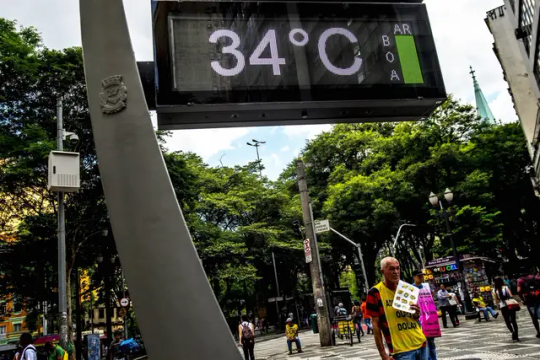
It’s been a hot, brutal, record-breaking summer across much of the world, and it’s not quite ready to let go as late-season heat waves bake parts of the United States, the United Kingdom, North Africa, and the Middle East.
The long goodbye is a fitting cap to a season of deadly heat that contributed to severe drought in some areas and torrential rainfall in others. High temperatures also set the stage for wildfires in Greece and Turkey, Canada, Hawaii, and Louisiana.
But at least people north of the equator can look forward to some relief as autumn and winter set in. The 850 million people in the Southern Hemisphere, on the other hand, are emerging from some of their hottest winter temperatures on record and bracing for even more heat as the warmer seasons begin.
In fact, the weather was pretty much like summer in June, July, and August across parts of South America, Africa, and Australia. Peruvians went to the beach last month as temperatures reached 82 degrees Fahrenheit. Similarly balmy weather engulfed Paraguay and Chile. Buenos Aires, Argentina, reached 86°F, the hottest August temperature in at least 117 years. The heat was downright dangerous in Brazil as thermometers ticked above 100°F. Australia’s Bureau of Meteorology confirmed this month that Australia experienced its hottest winter since record keeping began more than a century ago. Even down near the South Pole, warmer air and water have led to the lowest sea ice extent on record around Antarctica.
“Some of these set new records by a large margin, also known as ‘record shattering’ extremes,” explained Michael Grose, a senior research scientist at CSIRO, Australia’s government science agency, in an email.
Continue reading.
#brazil#politics#environmentalism#climate change#australia#argentina#south africa#brazilian politics#australian politics#argentine politics#south african politics#mod nise da silveira#image description in alt
153 notes
·
View notes
Text
Tibor Nagy Returns to U.S. State Department with Focus on Africa and Global Affairs
@TiborPNagyJr returns to the U.S. @StateDept, bringing decades of diplomatic experience in #Africa to address regional & global challenges. His expertise will be crucial in navigating complex issues in East Africa, particularly #Somaliland recognition
Continue reading Tibor Nagy Returns to U.S. State Department with Focus on Africa and Global Affairs
#Africa#Bureau of African Affairs#Djibouti#Donald Trump Presidency#Ethiopia#Horn of Africa#International Recognition#Somaliland#Sudan#Tibor Nagy#United States#US State Department
1 note
·
View note
Text
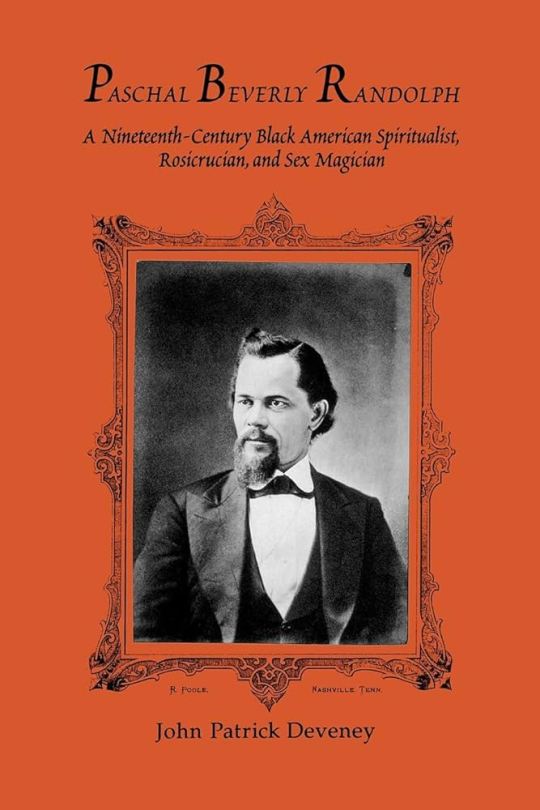
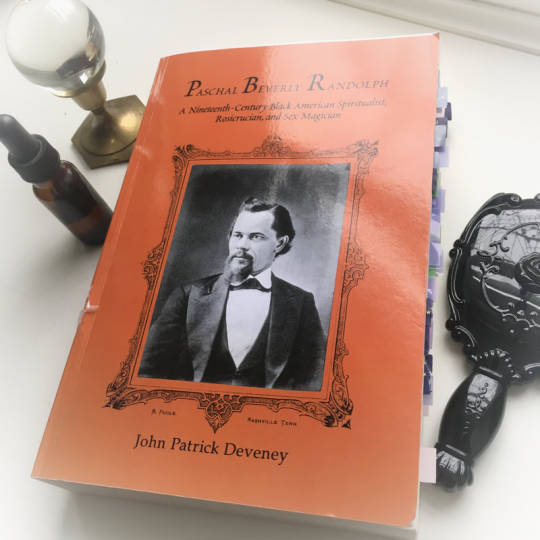
During the era of slavery, occultist Paschal Beverly Randolph began studying the occult and traveled and learned spiritual practices in Africa and Europe. Randolph was a mixed race free African man who wrote several books on the occult. In addition, Randolph was an abolitionist and spoke out against the practice of slavery in the South.
After the American Civil War, Randolph educated freedmen in schools for former slaves called Freedmen's Bureau Schools in New Orleans, Louisiana, where he studied Louisiana Voodoo and hoodoo in African American communities, documenting his findings in his book, Seership, The Magnetic Mirror. In 1874, Randolph organized a spiritual organization called Brotherhood of Eulis in Tennessee.
Through his travels, Randolph documented the continued African traditions in Hoodoo practiced by African Americans in the South. Randolph documented two African American men of Kongo origin that used Kongo conjure practices against each other. The two conjure men came from a slave ship that docked in Mobile Bay in 1860 or 1861.

#kongo#african american#mobile bay#randolph#paschal beverly randolph#sex magick#seership#magnetic mirror#tennessee#american civil war#louisiana voodoo#hoodoo#rootwork#conjure#ancestor veneration#witchblr#pagans of tumblr#afrakans#brownskin#africans#kemetic dreams#afrakan#african#brown skin#african culture#afrakan spirituality#africa#europe
68 notes
·
View notes
Text
The far-right violence against foreigners in the United Kingdom these days strongly reminds me of a novel published in the 1980s: J.M. Coetzee’s Waiting for the Barbarians.
Coetzee, a South African novelist who won the Nobel Prize in literature in 2003, describes in this slim volume exactly why and how this kind of violence erupts: because communities have been drip-fed lies and racial prejudices for a long time, until they form an image of strangers—in this novel, the barbarian nomadic tribes—that has very little to do anymore with reality.
The central character in Waiting for the Barbarians, which Philip Glass turned into an opera in 2005, is a middle-aged magistrate who has been running a sleepy border settlement of an unnamed Empire for years. Nothing ever happens in the village or in neighboring towns and villages. Everyone knows everyone. The subjects of the Empire and the barbarians living on the other side of the border, which is totally porous, have bent the rules so that everyone can go about their business without bothering others. The barbarians come to the village for food and medicine and go home afterward.
The magistrate must implement the rules of the Empire but tries to do this in a human, benign-ish way. When there is an occasional cattle raid, for example, he has a serious talk with those who did it. He hardly ever takes prisoners, and when he does, they are fed, kept clean, and often released early: “All my life I have believed in civilized behaviour.” In his view, conflicts do not benefit anyone and should be avoided. All is certainly not perfect, but it keeps the peace. The communities live more or less quietly side by side.
Then, one day, a delegation from the Empire’s secret service (the “Third Bureau”), led by Colonel Joll, visits the village. Joll, an unbending bureaucrat, is convinced that the nomad tribes are secretly preparing an attack on the Empire. He leads an expedition in search of rebels and radicals and comes back to the settlement with many suspects in chains. They are terrified. Suddenly, the prison is full. The inmates are humiliated, starved, and tortured. The magistrate tries to stop this (“These are fishermen, not rebels!”), but Colonel Joll sidelines him and continues to torture the barbarians until all “confess.”
After the colonel’s departure, the magistrate feeds the prisoners and sends most of them home. One of them is a nomad girl. He tends to her wounds, washes her feet, and sleeps with her. Eventually, he brings her all the way back to her tribe. When he returns home after the long journey, Joll is back. He has the magistrate charged with treason—“consorting with the enemy”—and throws him in the same jail where the barbarians are kept.
No one comes to the magistrate’s rescue. Many villagers have become as hysterical as the colonel, and the rest are lying low. By now, every barbarian seems like a terrorist to them. Any behavior that was once normal has become suspect. Eventually, of course, the village just destroys itself—without a single barbarian going on the attack. The settlement is a ruin. Most people have left, including the colonel and his people. The magistrate stays: He has nowhere to go. As a bitter winter cold sets in, he feels stupid, “like a man who lost his way long ago but presses on along a road that may lead nowhere.”
Although the novel was published in 1980, it has stark relevance for our times. Coetzee, whose Empire of course depicted South Africa under apartheid, shows how easy it is for a few zealots to turn communities that have long managed to live in peace against one another. All they need to do is to plant false, scary rumors about a particular group; embed them in a larger narrative about sovereignty, nationhood, and security; and then start pumping that narrative around. If citizens are scared enough, they are willing to believe it all. As Hermann Göring, the architect of Adolf Hitler’s Nazi police state, said when he was asked how he got the German people to accept Nazism: “The people can always be brought to the bidding of the leaders. That is easy. All you have to do is tell them they are being attacked and denounce the pacifists for lack of patriotism and exposing the country to danger.”
With this grim novel, Coetzee issued a strong, principled condemnation of South Africa’s apartheid regime, then still in full swing. (He immigrated to Australia later, in 2002.) Its relevance for today’s “far-right thuggery” in the U.K., as Prime Minister Keith Starmer put it last weekend, is no less clear. When far-right politicians fan the flames of racial and religious hatred for years, amplified by social media and newspapers calling migrants and asylum-seekers criminals, at some point Muslim communities and mosques will be targeted, asylum centers will be set ablaze, and Nazi salutes will be seen on the street.
In a democracy, words have consequences. A democracy is a political system that must ensure different communities in society do not get at one another’s throats. All communities have different interests. Therefore, there is always some friction between them. Because society is always changing, the balance between the communities is always changing, too. Democracy is meant to help them find a new balance, all the time. This applies to all levels of governance: local, provincial, national, European. Politics, journalism, and other institutions have a role to play in this system—a clear responsibility. Incitement, provocations, the spread of fake news, and the demonization of one community because of skin color or religion mean that they reject that responsibility. These are forms of democratic sabotage.
Coetzee’s message, voiced through the magistrate, is not a happy one. “To the last we will have learned nothing. In all of us, deep down, there seems to be something granite and unteachable.” Still, the magistrate plows on—what else can he do? He may be far from perfect, but he is a good man.
In the words of Coetzee, the real danger in society “always comes from within.” The U.K. is lucky to have a prime minister who seems to understand this.
20 notes
·
View notes
Note
Hello Astra!!!
In the original Criminal Case universe, what would be that one detail that you would change in each season??
Hey Sereno! It's nice to see you on Tumblr! I have a feeling this won't be the only ask I receive from you, and I look forward to any future ones you might send!
As for your question, ignoring the many changes I have already made in my series for seasons 1-4, here is one thing I would change in each season of Criminal Case!
Season 1 - Grimsborough
I usually give season 1 a pass on most things since it's the first game in the series, and therefore, it's expected that it will not be the best compared to its successors. That being said, something I would change about it is its representation of minorities. I know it can be argued that Grimsborough is a product of its time, and many of its stereotypes show that. Still, I think if Grimsborough were ever to be remade/remastered in the present, its storyline and characters should be updated for better representation. We saw that in later games, the representation was more accurate, like certain ethnicities, so it would be nice for season 1 to have an update to better represent the characters seen in it.
Season 2 - Pacific Bay
I would have liked the districts to have been better connected and for the season to have had a plot that spanned across it to help with that. Each district felt isolated and disconnected from the others to the point where I wondered, “How do such drastically different districts coexist next to each other?” I mean, seriously, you have White Peakes, a snow-covered, mountainous district next to a literal DESERT! While I enjoy some of the plots of the districts, overall, I wish the season could have been better connected and had more foreshadowing of the ending.
Season 3 - Save The World
Besides having someone else (cough Nathan cough) be the coroner instead of Grace and Michelle surviving the season, another change that could be made to STW would be a better foreshadowing of there being a mole on the Bureau. I’m not saying it had to be obvious or stated earlier than its reveal in the Africa Region, but it would have made things more interesting had they been foreshadowed earlier in the season. Likewise, there could have been references to cases from past regions to show how the mole was betraying the team from the beginning instead of just a few things in the cases leading up to In Plain Sight.
Season 4 - Mysteries of The Past
While there are a few little things throughout the season that I would like to change, such as making CelineXGreta canon, the Flying Squad doing a better job at protecting Vinnie, and Giulietta and Seamus getting a happily ever after, one change I would make in S4 would be for Leopold Rochester to live. He was one of the best Rochesters and didn’t deserve to die! I would have loved to see him and Lady Highmore get married and he eventually become the mayor’s husband. This man would have been such a supportive husband and would have done everything he could to help The Resistance like Lady Highmore did! We were robbed of what would have been a beautiful love story…
Season 5 - The Conspiracy
One idea I had for The Conspiracy was instead of Grace joining the Bureau, the way she returned as a teammate again was to replace Rupert following his death in season 5. Not that I don't think Amir was capable of taking over Rupert’s position but going from Lab Assistant to Lab Chief seemed like a significant jump in positions. An alternative could have been for Grace to return to Grimsborough after accepting the job offer from Donna to become Lab Chief, as Grace would undoubtedly have the knowledge and experience for the job. It would have also kept the theme of having two forensic experts that The Conspiracy had going for the rest of the season.
Season 6 - Travel In Time
I would have liked a district set in the MotP era. I’m not saying I wish we lost any of the canon districts, but I think it would have been interesting to visit Concordia and meet the Flying Squad. Plus, it would have helped connect that season to the others beyond references in following seasons since, unlike the other seasons, we can't meet any of the characters outside of season 4. (Excluding Maggie O’Malley, but I don't count her since she was a baby and never mentioned Concordia in S2.)
Again, I do not wish for any canon districts not to exist, but if I had to pick one to replace the MotP one with, it would be The 60s. I feel like it would be the easiest to replace since, to me, it's not as connected to the plot as the other districts after learning about the sabotage and alternate future. I don’t know when exactly during MotP it would take place (before, during, or after the canon timeline), but regardless, I would have LOVED to have visited Concordia during Travel In Time!
Season 7 - Supernatural Investigations
My biggest issue with season 7 is how rushed the final district feels, especially the last case. I already complained about how I hate how PS made Mathison a demon with ZERO foreshadowing and ruined his character with the “twist.” I have also said he will not be a demon in my story, so I’m excluding that plot point from my answer. I would want the ending to flow better and to resolve things in a way that made more sense instead of just, “We saved the world. Everyone’s mistakes are forgiven! :D” (If you know what I’m referencing, I need not say anymore.)
(I’d also love for Arthur not to be the final victim and for him to live to see the Demon Queen’s defeat, but I’m not sure if even I could rewrite the case that much… But that doesn't mean I might not try to!)
Season 8 - City of Romance
Besides rewriting nearly the entire season? It might be easier for me to pick a detail I WOULDN’T change since there are so many things I would change that it's going to take me a minute to pick one…
Okay, minutes up!
One detail (among many) I would change in S8 is that past characters (excluding Jones) didn’t recognize you. I have a solution for this same issue in S7, but for this season, I have a few ideas I’m still considering… Likewise, I would have liked this season to have more references to past seasons and their cases. It also should have had more cameos from past teammates and almost been like a reunion season to help say goodbye to the game.
… Okay, maybe I listed a few details I would change this season, but you can't blame me! There’s a lot that can be changed in S8 to make it better, so I think I’m allowed to make an exception!
I always enjoy seeing what changes people would like to/do make to Criminal Case through stories, artwork, or other content. I have plenty of things planned for my series, and some of the changes I listed will happen along with others, so I look forward to what the future holds!
Thanks for the ask!
#criminal case#criminal case grimsborough#criminal case pacific bay#criminal case save the world#criminal case mysteries of the past#criminal case the conspiracy#criminal case travel in time#criminal case supernatural investigations#criminal case city of romance#astra's thoughts#ask
15 notes
·
View notes
Text
American Bonaparte: Napoléon's Great-Nephew in the President's Cabinet
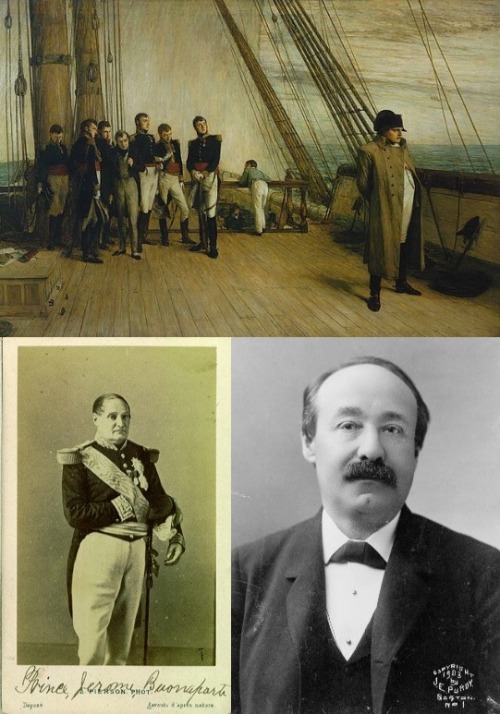
In June 1815, Napoléon Bonaparte’s bid for continued military glory in Europe was crushed by allied British and Prussian troops at the Battle of Waterloo. Following his surrender, the former Emperor of France had hoped that the British might allow him to live the remainder of his life in exile in the United States. However, Napoléon had already escaped exile once before (from the Mediterranean island of Elba) and once again rallied the French around him in a last-ditch effort to conquer the European continent prior to Waterloo. Unwilling to risk another vanishing act, the British instead banished Napoléon to one of the most isolated places in the world – the remote island of Saint Helena, in the middle of the South Atlantic Ocean, between Africa and South Africa – for the rest of his life.
Some of the Bonaparte family did eventually reach the United States, however. In 1905, President Theodore Roosevelt appointed Charles Joseph Bonaparte (1851-1921), the American-born grandson of Napoléon’s youngest brother, Jérôme, as the U.S. Secretary of the Navy. A year later, Roosevelt shifted Bonaparte from the Department of the Navy to the Justice Department. For the rest of Theodore Roosevelt’s Presidency, the great-nephew of the man responsible for the Napoléonic code was the United States Attorney General – America’s top law enforcement official – where he helped establish the Bureau of Investigation, better known today as the FBI.
#History#Napoleon#Napoleon Bonaparte#Battle of Waterloo#Waterloo#France#U.S. Government#Jérôme Bonaparte#Charles Joseph Bonaparte#Theodore Roosevelt#TR#President Roosevelt#Roosevelt Administration#Cabinet#Presidential Cabinets#Cabinet of Theodore Roosevelt#U.S. Attorney General#U.S. Secretary of the Navy#Attorney General#Bonaparte#Bonaparte Family#Executive Branch#Cabinet Secretaries#French History#FBI#FBI History#Federal Bureau of Investigation#DOJ#Department of Justice#Justice Department
32 notes
·
View notes
Text
"A colonialist understanding of the country’s desolation before the arrival of the Zionist settlers has been invoked by countless Zionist statesmen and scholars. ... It reiterates the conventional colonial narrative – used in relation to Algeria, Australia, Western Africa, South-East Asia and the homelands of indigenous nations in the United States – to suggest that White colonists benevolently tame the wild environment and its barbarian inhabitants through the application of science and technology. In line with this myth, Zionist settlers were instructed, even before their arrival, that they were the rightful owners of the land. This made their violence against the indigenous population unavoidable.
... In the light of this perception, peace treaties or proposals for peaceful coexistence between colonizers and indigenous populations – whether Tasmanian, Māori, Algerian, Native American Nations, or Palestinian – turned out to be nothing more than fresh strategies to make their elimination possible. In the case of Palestine, the Arab Bureau of the Jewish Agency maintained informal relations with some ‘moderate’ Palestinian leaders before 1948, not to explore ways to achieve understanding, but to gather intelligence and ‘maneuver to split Arab ranks’."
Ahmad H. Sa'di, "Towards a Decolonization of Palestine Studies," in Decolonizing the Study of Palestine: Indigenous Perspectives and Settler Colonialism (2023)
34 notes
·
View notes
Text
Gawande said the stop work order "stops work battling a deadly Marburg outbreak in Tanzania and a wide outbreak of a mpox variant killing children in west Africa before it spreads further," "stops monitoring of bird flu in 49 countries, a disease which already killed an American on home soil," "stops critical work to eradicate polio," and even "stops >$1B in corporate drug donations and coordination eradicating tropical diseases like river blindness, elephantiasis, and others on the verge of elimination in whole regions."
Further, he said, the plan "stops medicines, supplies, systems building, staff support aiding >90 million women and children to get low cost vaccinations, prenatal care, safe childbirth, contraception, and other basic lifesaving health needs."
He added that it also "stops direct services for 6.5 million orphans, vulnerable children, and their caregivers affected by HIV in 23 countries," "stops donated drug supplies keeping 20 million people living with HIV alive," and "would furlough all USAID contract staff — which includes half of its global health bureau—unless exempted."
"This Administration is trashing US standing, alliances with scores of countries built over half a century, world-leading capacity and expertise, and American security," the expert added.
Source
ETA: it's like he's trying to have a pandemic while he's in office. Again.
5 notes
·
View notes
Text

PSYCHO-PASS: Providence - According to Japanese Twitter
After a long wait (or maybe it just felt long to me), PSYCHO-PASS: Providence finally hits North American theaters this week (14 July 2023), before becoming more widely internationally available in early August.
Unfortunately, as I'm not currently in Japan, I've not yet seen it. Fortunately, I speak Japanese, so I've read pretty much everything I could find about what happens. If you're like me and can't wait to see it in cinemas/don't mind major spoilers, this post is for you.
What follows is a compilation of everything my sister and I know about PPP -- drawing from fan talk on Twitter, director and writer interviews and tweets, and other official promotional materials only available in Japanese -- without actually having seen it.
We also explain some of the major plot points and go into detail on the real-life works referenced in the film, so if you watched it but feel like you could still use some clarification (as many Japanese fans did), this post might be for you too.
Once again, this post is nothing but spoilers (to be taken with several grains of salt as there is a certain amount of guesswork involved), so read on at your own risk.
*Note: "SN" denotes tweets/quotes by director Shiotani Naoyoshi.

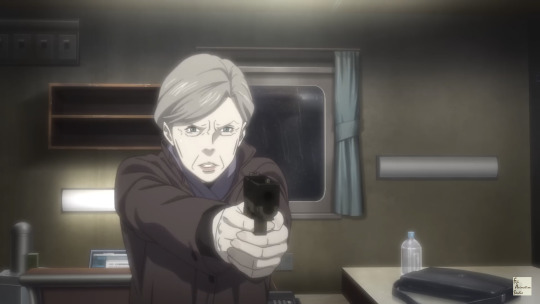
We open on a snowy, stormy night, January 2118 (2 months post-SS Case.3).
A team of armed mercenaries board a transport ship off the coast of Kanagawa, Japan and set about killing the Ministry of Foreign Affairs (MOFA) Suppressing Action Department (SAD) agents on board.
Among them is Kai Mikhaylov, a Russian agent with a large burn scar on the left half of his face.
Kai Mikhaylov (VA: Kase Yasuyuki): A member of the “Peacebreakers.” In order to obtain the Stronskaya Document, he launches an attack on the ship Milcia is on.
Leading the mercenaries is fellow mercenary Bokamoso Murray, who sports distinctive red dreadlocks.
Bokamoso Murray (VA: Shirokuma Hiroshi): A combatant affiliated with the “Peacebreakers.” He operates in tandem with Kai Mikhaylov; beginning with the assault on the Grootslang, he works to seize the Stronskaya Document.
For the record, the Grootslang (the ship’s name) is a mythical giant snake rumoured to dwell deep in a cave in the Richtersveld, South Africa. It’s said that anyone who encounters it will meet with misfortune. Well then.
Indoors on the same ship, we find Dr Milicia Stronskaya, who has been invited to Tokyo from Russia to participate in an important political conference.
Milcia Stronskaya (VA: Tsuda Shōko): A researcher and global authority on behavioural economics and statistics. She establishes the basic theory simulation referred to as the “Stronskaya Document.”
Realising the ship is under attack, she hurriedly sends a communication to someone, apologising under her breath as she does so.
She pulls out a gun just as a helmeted mercenary bursts into the room, and she shoots him dead. You can tell from how she handles it that she’s competent.
Kai charges in next, dodging her shots and pinning her down.
Leaning over her, Kai calls her “professor,” at which she startles. He then says to her, “There’s nowhere left to run.”
Kai shoots Dr Stronskaya, killing her.
Bokamoso shows up then and says to Kai, “You screwed up, huh, Kai,” and “We’re switching to Plan B.”


Meanwhile, Kogami Shinya, one of our two main protagonists, heads to her rescue.
Kōgami Shinya (VA: Seki Tomokazu): Special Investigator, Suppressing Action Department, Overseas Coordination Bureau, Ministry of Foreign Affairs. Age 33. He was living a nomadic life abroad acting as a mercenary but was recruited by Frederica and returned to Japan; currently, he’s pursuing international incidents. He prides himself on his advanced combat techniques and honed physique.
Kogami makes an insane jump from an aircraft wearing a wingsuit. (I’ve seen him described alternately as Batman, Captain America, and a flying squirrel here lol)
SN: What colour suits a man who flies... Thinking about it.
Kogami proceeds to fight his way through the enemy soldiers with his typical efficiency.
Unfortunately, he arrives too late to save the professor, and the mercenaries have already absconded with her head. The reason for this is explained later.
On deck, Bokamoso and his team board their aircraft and make their escape.
Kogami, who has followed them out, takes aim at the aircraft but is tackled to the deck by a reanimated SAD agent. The man’s mouth doesn’t move but we hear a voice quoting what appears to be a passage from a religious text.
An explosion goes off and Kogami breaks free of his attacker and escapes the conflagration by jumping into the ocean.
Backlit by the flames and treading water, Kogami — vexed but composed as usual — reports on the situation via his device.
<<Opening Credits>>
OP: 「アレキシサイミアスペア」 (alexithymiaspare) ~ 凛として時雨 (Ling tosite sigure)
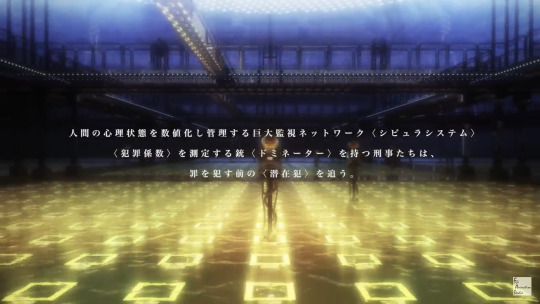

We cut to the opening credits, set to Ling tosite sigure’s “Alexthymiaspare.” The group also contributed to the soundtracks for PP1, PP2, and PP: The Movie (M1), so this is one of many ways in which the film “returns to its roots.”
The credits are then followed by a brief shot of the Sibyl System accompanied by the following text: 《"The Sibyl System," a vast surveillance network that assigns numeric values to and governs human beings’ mental states. Detectives who carry "Dominators" — guns that measure "crime coefficients" — pursue "latent criminals" before they commit crimes.》


The next morning, our other main protagonist, Tsunemori Akane, now Chief Inspector of the CID, attends a meeting of senior bureaucrats to discuss the proposed abolishment of the Ministry of Justice and the old system of law.
Tsunemori Akane (VA: Hanazawa Kana): Chief Inspector of the Ministry of Health and Welfare’s Public Safety Bureau. Age 25. She commands the Public Safety Bureau’s Criminal Investigation Department. She possesses an incontrovertible sense of justice and a stalwart mentality that makes it difficult for her Hue to cloud; she makes an appeal for maintaining the law under the Sibyl System.
The official name of the conference, which is being held at Nona Tower (i.e. the Ministry of Welfare’s HQ), is “Review Meeting on the Topic of the Overseas Expansion of Industry RE: the Sibyl System.”
Shindo Atsushi — father to PP3 protagonist Shindo Arata — is also in attendance, alongside officials from the Ministry of Health and Welfare, the Ministry of Public Management, Home Affairs, Posts and Telecommunications, the Ministry of Justice, and the Ministry of Foreign Affairs.
Shindō Atsushi (VA: Sugō Takayuki): Director-General of the Statistics Department, Minister’s Secretariat, Ministry of Health and Welfare. One of the elite who started his career as an Inspector [at the CID] and entered the MHW. He’s involved in the exportation of the Sibyl System, immigration policy, etc.
For the record, this is the same conference that Dr Stronskaya was originally scheduled to attend at Atsushi’s invitation.
Akane is the only woman and by far the youngest person present, but she doesn’t hesitate to say her piece. When it’s her turn to speak, she opens by saying, “‘Under the Sibyl System, the law is unnecessary.’ Is that truly the case?”
Akane is basically the sole voice of dissent, while Atsushi assumes a more neutral position.
During the meeting, Atsushi receives a text message, which he checks covertly before stashing his device in an inner pocket of his suit jacket.
Moments later, Akane receives a red alert on her device and excuses herself.
Atsushi calls a break in the meeting while Akane steps out to take a call from Mika.
Shimotsuki Mika (VA: Sakura Ayane): Inspector, Division 1, Criminal Investigation Department, Public Safety Bureau, Ministry of Health and Welfare. Age 21. The youngest Inspector ever inducted. At the time, she took a negative stance towards Akane’s way of thinking, but the two have a good working relationship now. She’s competitive but possesses both presence of mind and rational judgement.
Director Shiotani tweeted a quote by Rousseau that I saw someone identify as having been in reference to this scene. It’s not clear to me though whether a character quotes it aloud, or if Shiotani just meant it as an overarching theme:
SN: “Keep this truth ever before you—Ignorance never did any one any harm, error alone is fatal, and we do not lose our way through ignorance but through self-confidence.” by.Rousseau
from Rousseau’s Emile (On Education), Book III
SN: “Real knowledge is knowing the extent of one’s ignorance.”〈matcha emoji〉
from Confucius’ Analects II, Political Philosophy
Keep reading here.
#psycho pass#psycho pass: providence#PPP#akane tsunemori#tsunemori akane#kogami shinya#ginoza nobuchika#spoilers#foundintranslation#サイコパス#常守朱#狡噛信也#宜野座伸元#塩谷直義#Sugou Teppei#Kunizuka Yayoi#Karanomori Shion#Hinakawa Sho#Shimotsuki Mika#SaigaJouji#Hanashiro Frederica#Shindo Arata#Kei Mikhail Ignatov#PP1#PP2#PP3
80 notes
·
View notes